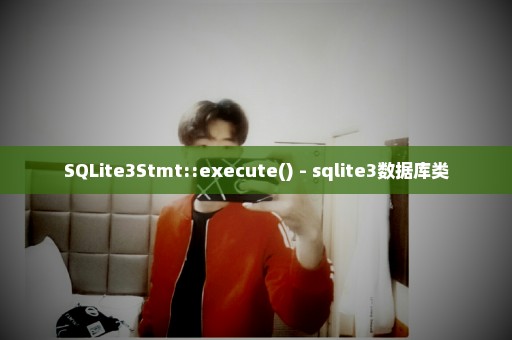SQLite3Stmt::execute() - sqlite3数据库类
SQLite3Stmt::execute()
(PHP 5 >= 5.3.0, PHP 7)
Executes a prepared statement and returns a result set object
说明
publicSQLite3Stmt::execute(void): SQLite3ResultExecutes a prepared statement and returns a result set object.
CautionResult set objects retrieved by calling this method on the same statement object are not independent, but rather share the same underlying structure. Therefore it is recommended to call SQLite3Result::finalize(), before calling SQLite3Stmt::execute() on the same statement object again.
参数
此函数没有参数。
返回值

Returns an SQLite3Result object on successful execution of the prepared statement,FALSE on failure.
参见
- SQLite3::prepare() Prepares an SQL statement for execution
- SQLite3Stmt::bindValue() Binds the value of a parameter to a statement variable
- SQLite3Stmt::bindParam() Binds a parameter to a statement variable
There's currently an issue in the SQLite3 PHP binding (not SQLite3 itself) that causes all queries to be executed twice. It has apparently existed for quite a while. See here for more info: https://bugs.php.net/bug.php?id=64531 Before discovering the above, I posted this: http://stackoverflow.com/questions/36617708/odd-behavior-with-sqlite3-non-select-prepared-transactions-and-fetcharray (includes copy-paste bug demo) Workaround: I strongly recommend wrapping any code that might run fetchArray() on non-SELECT query results inside a numColumns() check, like this: To clarify: - Query #1 is where the SQLite3 query is executed the first time, query #2 is where the query is executed again. Yes, *everything* is executed twice; this is the bug. - If your code will only read from and not alter the database (so, a SELECT that won't cause database-altering triggers to run, for example), you're fine. Your query runs twice but it doesn't alter the result. - If your code will write to the database - for example an INSERT - you MUST not run fetchArray() (and execute the query again) if the number of columns is zero. - It's not documented in the manual but over here -http://php.net/manual/en/book.sqlite3.php#113144 - user 'bohwaz' mentions that there's also a SQLite3Stmt::readOnly() function since PHP 5.3.11 which will tell you if you just wrote to the DB. This is currently undocumented but might be a more appropriate alternative to numColumns() (I'm not sure what it does, it might be the same). You might prefer PDO for higher-volume work with SQLite3. This binding is ironically lighter-weight and provides direct access to some SQLite3-specific primitives and behavior... but it runs all queries twice. [[Note to moderators (this section may be deleted once it has been read; I'm also fine with feedback on the following): - Please don't consider this comment a bug report - I just want others to be aware of this issue so they don't have to bumble around for hours scratching their heads. :P - As of the submission date of this comment, there's a unapproved diff for this page stuck in DocBook so I can't add something like "due to bug #64531, you are recommended to wrap fetchArray() inside numColumns()...", which I think would carry more weight than this comment until this bug is fixed.]]
I had luck in avoiding prepared statements from executing multiple times by finalize()'ing the result after execution. $stmt->execute() >finalize(); Hope this helps others.
鹏仔微信 15129739599 鹏仔QQ344225443 鹏仔前端 pjxi.com 共享博客 sharedbk.com
图片声明:本站部分配图来自网络。本站只作为美观性配图使用,无任何非法侵犯第三方意图,一切解释权归图片著作权方,本站不承担任何责任。如有恶意碰瓷者,必当奉陪到底严惩不贷!
 百科狗
百科狗



